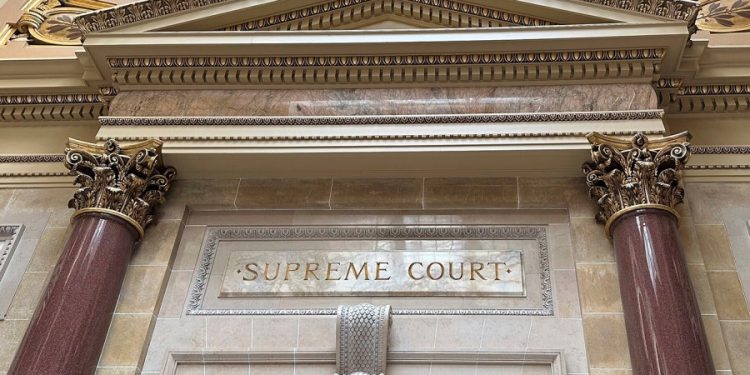A Wisconsin legislative committee controlled by Republicans violated the state constitution when it rejected a state agency rule to ban conversion therapy practices, the Wisconsin Supreme Court ruled Tuesday, clearing the way for the state to enforce the rule and blunting the Legislature’s power to block state regulations.
The Wisconsin Legislature’s powerful Joint Committee for Review of Administrative Rules (JCRAR), responsible for approving state agency regulations, had twice rejected a Wisconsin state licensing board’s rule to ban conversion therapy, a discredited practice that aims to change a person’s sexuality or gender identity.
Democratic Gov. Tony Evers, who barred state and federal funds from being used for conversion therapy in a 2021 executive order, sued Wisconsin’s GOP-controlled Legislature in 2023 for obstructing “basic government functions.” The lawsuit targets the joint committee’s vote on the conversion therapy rule and a separate rule to update commercial building standards.
Evers argued that JCRAR’s actions amounted to unconstitutional “legislative vetoes,” which he said collapsed the state’s powers “into a single branch of government” and circumvented “the constitutional lawmaking procedures of bicameralism,” by which a bill must pass through both the state House and Senate, and presentment to the governor.
An attorney for the Legislature stated during oral arguments in January that the rules committee’s actions provided lawmakers with a “grace period” to review the policy within their constitutional role.
Republicans in the state Legislature have said their votes to suspend the rule are based on a belief that the rule limits the freedom of speech and religion of mental health providers, not opposition to the rule itself.
In a 4-3 decision on Tuesday, the Wisconsin Supreme Court sided with Evers, ruling that JCRAR cannot pause, object to or suspend a rule’s implementation without legislation.
“The challenged statutes empower JCRAR to take action that alters the legal rights and duties of the executive branch and the people of Wisconsin. Yet these statutes do not require bicameralism and presentment,” the court’s liberal majority wrote in its ruling. “Therefore, we hold that each of the challenged statutes … facially violates the Wisconsin Constitution’s bicameralism and presentment requirements.”
The decision clears the way for the state to enact the conversion therapy ban, though it was not immediately clear when the rule would take effect.
“For years, a small group of Republican lawmakers overstepped their power, holding rules hostage without explanation or action and causing gridlock across state government,” Evers said in a statement on Tuesday. “It’s pretty simple — a handful of Republican lawmakers should not be able to single-handedly and indefinitely obstruct state agencies from doing the people’s work.”
“Ensuring that the Legislature is held accountable for following the law and our state’s constitution is a victory for the people of Wisconsin,” he said about the state Supreme Court’s decision.
The high court will maintain its liberal majority when Justice-elect Susan Crawford takes office in August, replacing retiring Justice Ann Walsh Bradley. Crawford won a contentious race for Bradley’s seat in April, in the most expensive judicial election in U.S. history.
In a statement issued after Tuesday’s ruling, Republican state Sen. Steve Nass, a JCRAR co-chair, said the court “has in essence given Evers the powers of a King.”
“Today, the liberal majority of the Wisconsin Supreme Court ended nearly 7 decades of shared governance between the legislature and executive branch agencies aimed at protecting the rights of individuals, families and businesses from the excessive actions of bureaucrats,” he said. “Governor Evers asked his liberal allies on the state supreme court to give him unchecked dominion to issue edicts without legislative review that will harm the rights of citizens in order to enact his extreme agenda.”
The court’s three conservatives, Justices Rebecca Bradley, Annette Ziegler and Brian Hagedorn, similarly criticized Tuesday’s decision.
Bradley wrote in a dissenting opinion that the court’s majority ruling “lets the executive branch exercise lawmaking power unfettered and unchecked.”
“Progressives like to protest against ‘kings,’” she added, “unless it is one of their own making.”















